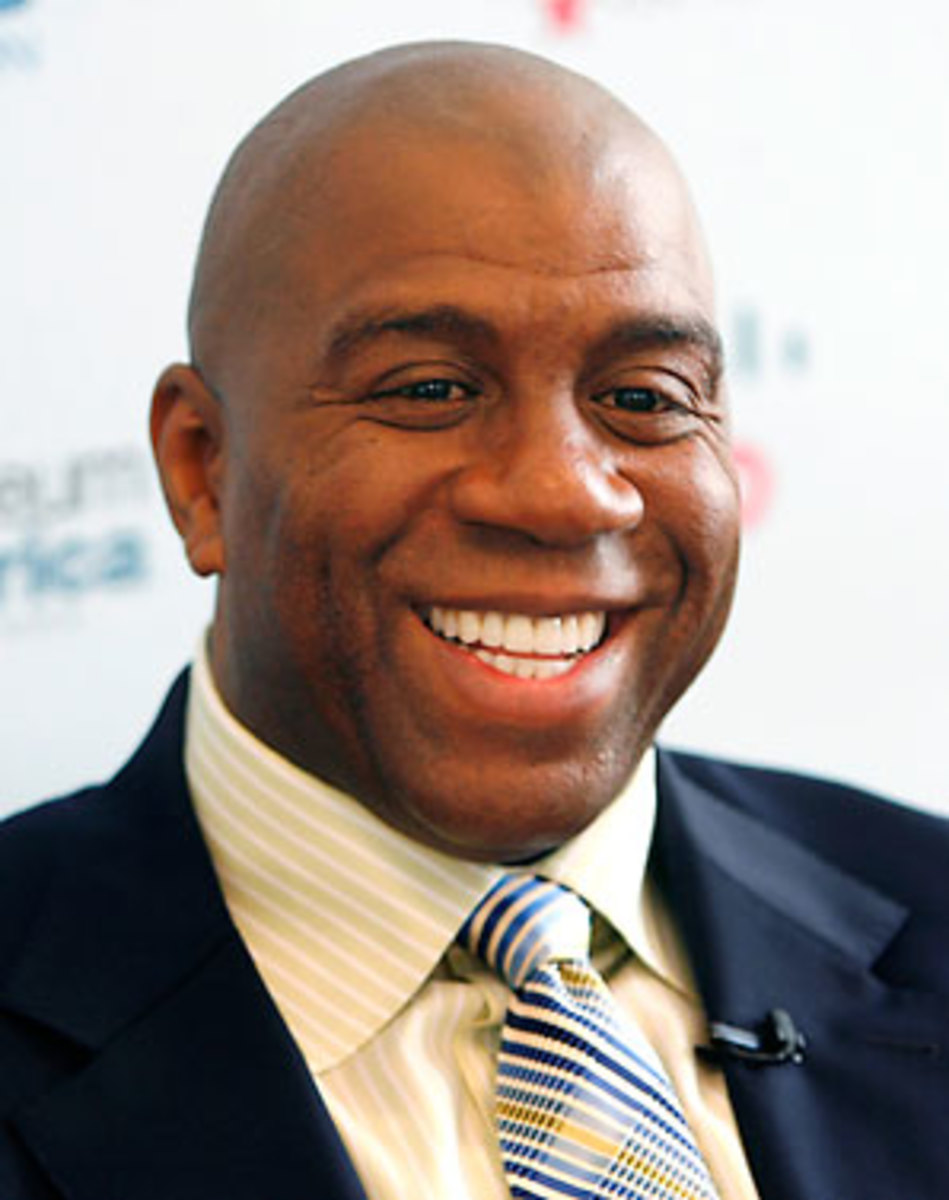Floundering Dodgers get just what they need: a dose of Magic
The best trade in the history of the Dodgers was made Monday night.
They swapped the biggest scoundrel in Los Angeles for the biggest prince, an East Coast carpetbagger for a West Coast institution, pursed lips for a glittery smile. Magic Johnson, the leader of the Dodgers' new ownership group, is a five-time NBA champion. Frank McCourt, the disgraced seller, is a loser too many times to count. McCourt made his money in Boston parking lots. Johnson reinvested his fortune in tough L.A. neighborhoods. McCourt spent the past two years in bankruptcy and divorce courts. Johnson was honored by documentarians and Broadway producers two decades after being diagnosed with HIV. McCourt needed a raft of crisis PR experts to navigate a simple press conference. Johnson won't even need notes.
Johnson is an emblem of L.A. in the '80s, Showtime at The Forum, Kirk Gibson at Chavez Ravine. McCourt is an emblem of America in the '00s, wannabes buying what they can't afford, and waiting for someone to bail them out. McCourt's reward, for driving one of baseball's signature franchises into bankruptcy, is a world record $2.15 billion selling price. Like so many other shifty CEOs, he floats away on a gilded parachute, to an estate where he can still get his hair done once a week. But all the money can't repair the legacy. He goes down as one of the worst stewards in sports history.
Michael Jordan is proof that the best athletes don't necessary become the best owners, but Jordan makes player personnel decisions in Charlotte. Johnson will leave that to Stan Kasten, former Braves and Nationals president. Financial backing will come from Mark Walter, chief executive of Guggenheim Partners. Johnson is going to be little more than a figurehead, the pied piper of Dodger baseball, and at this point there is no more important role. Every public appearance will build back the credibility McCourt methodically stripped away.
Since the news came out on Tuesday night, much has been said about the challenges facing Johnson, as if he is heading into Boston Garden with a 3-games-to-2 deficit. But this is perhaps the easiest undertaking of his career. In sports, no one wants to follow a legend, and everyone wants to follow a sap. If Johnson were taking over for former Dodgers owner Peter O'Malley, he might be in some trouble. But he is taking over for McCourt, and if he throws the first pitch at Dodger Stadium on Opening Day, he will hear a louder ovation than Matt Kemp or Clayton Kershaw.
Fans are able to distinguish between their teams and their owners, and in L.A., there was never any real dissatisfaction with the Dodgers. It was always aimed at McCourt. The downfall of Manny Ramirez, the departure of Joe Torre, the beating of Bryan Stow: McCourt, McCourt, McCourt. Whatever Johnson does, so long as he does not welcome McCourt into the owner's box, will be hailed as ingenious by comparison.
The Dodgers are not the Mets, another big-city NL franchise that has recently dealt with financial difficulties and ownership scandal. L.A. has Kemp, the NL MVP runner-up in 2011, anchoring the lineup and Kershaw, the reigning NL Cy Young winner, fronting the rotation. The Dodgers will finalize their local television contract this year and be major players on the free-agent market next winter. The new owners will be tempted to win back fans with splashy moves, but that strategy did not work for Fox when it followed O'Malley. They must first bolster the Dodgers' international program, an area where they used to be pioneers, before McCourt let it lapse.
Fixing the small holes in the franchise infrastructure will be far more difficult than rekindling the interest of the city. That process is already underway, and it will only accelerate the moment Johnson slips on a Dodgers hat and glides through South Los Angeles, kids and cameras following close behind. Every franchise needs a face, and in a city of stars, the face needs to be recognized. Ramirez was an artificial one. Kemp and Kershaw are emergent ones. Johnson is not only recognized, he is as respected in this city as Spielberg.
Last summer, I talked to a fan who ordered a Dodger jersey with the word "Chapter" stitched on the back, over the number "11." He didn't want to buy the jersey. He didn't want to boycott the games. He watched every night on television. He missed Dodger Stadium like an old friend. But he couldn't allow himself to spend a cent that might end up in McCourt's pocket. "When there's someone new," he said, "I'll be back."
April 10, the Dodgers return.





